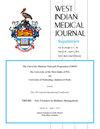Ganja会导致精神疾病吗?基于人口的牙买加心理健康素养评估视角
IF 0.3
4区 医学
Q4 MEDICINE, GENERAL & INTERNAL
引用次数: 0
摘要
目的:精神疾病是发病率的主要原因,在全球范围内,其终生风险很高。众所周知,心理健康知识可以改善症状识别、寻求护理和治疗结果。因此,本研究试图评估牙买加人对精神疾病的定义、病因、症状学、治疗和预防的知识和信念。方法:在牙买加进行的一项横断面调查中,一个具有全国代表性的随机抽样1224名受访者完成了一份50项问卷。结果:最高比例的受访者(31.9%)将心理健康定义为“疯子/精神失常”,57.4%将心理疾病定义为“疯狂/精神失常/精神不正常”。尽管大多数受访者认为可以识别精神疾病,但对识别特征的感知各不相同:担忧(68.6%)、吸烟(62.3%)和学习过多(47.9%)。教育水平和年龄与识别精神疾病的方式感知显著相关。性别和教育水平与对精神疾病治疗和预防的看法显著相关。结论:对精神疾病的定义、病因、症状、治疗和预防的认识有限。心理健康素养低与很少或没有受过正规教育、是男性和年龄较小(15-29岁)有关。本文章由计算机程序翻译,如有差异,请以英文原文为准。
Does Ganja Cause Mental Illness? Perspectives from a Population-based Assessment of Mental Health Literacy in Jamaica
Objective: Mental illness is a major cause of morbidity and, globally, has a high lifetime risk. Mental health literacy is known to improve symptom recognition, care-seeking and treatment outcomes. This study therefore sought to assess the knowledge and beliefs of Jamaicans regarding the definition, aetiology, symptomatology, treatment and prevention of mental illness. Method: A nationally representative, randomly selected sample of 1224 respondents completed a 50-item questionnaire in a cross-sectional survey in Jamaica. Results: The highest proportion of respondents (31.9%) defined mental health as ‘a mad person/mentally disturbed’ while 57.4% defined mental illness as ‘mad/mentally disturbed/not in the right mind’. Though the majority of the respondents believed that mental illness could be identified, perception of identification features varied: worrying (68.6%), smoking ganja (62.3%) and studying too much (47.9%). Level of education and age were significantly associated with perceptions on ways to identify mental illness. Gender and educational level were significantly associated with perceptions on treatment and prevention of mental illness. Conclusion: There was limited knowledge of the definition, aetiology, symptomatology, treatment and prevention of mental illness. Low mental health literacy was associated with having little or no formal education, being a male and being in the younger age group (15–29 years).
求助全文
通过发布文献求助,成功后即可免费获取论文全文。
去求助
来源期刊

West Indian Medical Journal
医学-医学:内科
CiteScore
0.20
自引率
0.00%
发文量
0
审稿时长
4-8 weeks
期刊介绍:
The Journal is international in scope, with author and editorial contributions from across the globe. The focus is on clinical and epidemiological aspects of tropical and infectious diseases, new and re-emerging infections, chronic non-communicable diseases, and medical conditions prevalent in the Latin America-Caribbean region, and of significance to global health, especially in developing countries. The Journal covers all medical disciplines, as well as basic and translational research elucidating the pathophysiologic basis of diseases or focussing on new therapeutic approaches, and publishes original scientific research, reviews, case reports, brief communications, letters, commentaries and medical images. The Journal publishes four to six issues and four supplements annually. English is the language of publication but Abstracts are also duplicated in Spanish. Most of the articles are submitted at the authors’ initiative, but some are solicited by the Editor-in-Chief. Unless expressly stated, the Editorial Board does not accept responsibility for authors’ opinions.
All papers on submission are reviewed by a subcommittee. Those deemed worthy for review are sent to two or three reviewers (one of the three might be a statistician if necessary). The returned papers with reviewer comments are reviewed by the Editor-in-Chief. Papers may be rejected, accepted or sent back to authors for revision. Resubmitted papers from authors are reviewed by the Editor-in-Chief and may be sent back to reviewers or a final decision made by Editor-in-Chief. The decision of the Editorial Board is final with regards to rejected articles. Rejected articles will not be returned to the authors. The editorial subcommittee has the right to return sub-standard manuscripts to the authors, rather than passing them on to the reviewers. This implies outright rejection of the manuscript.
 求助内容:
求助内容: 应助结果提醒方式:
应助结果提醒方式:


